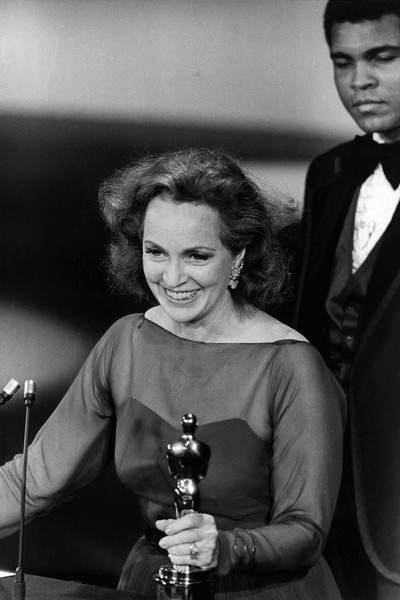
If you’re a fan of Oscar trivia, you probably know the answer to “What’s the shortest Oscar-winning performance?” Clocking in at just over five minutes, Beatrice Straight won Best Supporting Actress for her performance in “Network”. Most trivia geeks are happy just to leave it at that. But how did Beatrice Straight, a stage actress who rarely made films, win over Hollywood’s elite and take home acting’s highest honor with such limited screen time?
First off, let’s look at the actual performance. What it lacks in screen time, it more than makes up for in flashiness. Straight plays Louise Schumacher, the wife of TV news president Max Schumacher (William Holden). She appears briefly in the first half of the film, mainly just to establish that Max has a wife and to inform Max that Howard Beale (Peter Finch) has disappeared from crashing on their living room couch. You can briefly see the back of her head in her second scene as she, Max, and their daughter (Cindy Grover) watch the infamous “Mad as Hell” scene on TV. But the real Oscar gold comes in her third and final scene. Seated in their kitchen, Max confesses to Louise that he is having an affair with younger woman Diana (Faye Dunaway). What follows is an extended monologue in which Louise expresses her anger, her sadness, and eventually, the beginnings of her acceptance that her marriage is over. It is a scene that every actor dreams of playing, with a wide range of emotions and colorful dialogue. Certainly a memorable part no matter who played it, and Beatrice Straight absolutely nails it. In a film filled with cynical, corrupted people, Louise is the only person capable of complex emotion, and Straight brings all of it to the table in a performance that still gets to me, even on my umpteenth viewing of “Network”.
But of course, no actor wins an Oscar on the performance alone; there are always a few outside factors in play. For starters, “Network” was clearly a favorite among the Academy, leading the pack (alongside “Rocky”) with 10 nominations. It went over well with the acting branch in particular; Straight was one of five actors from the film to be nominated (“Network” is the most recent film to have received that many acting nods). And Straight wasn’t the only minor role to get nominated; Ned Beatty was up for Best Supporting Actor for his brief but equally showy role as Arthur Jensen. Prior to the nominations announcement, Straight did a few interviews for the film’s promotion, which no doubt helped boost her signal to Oscar voters, leading to a nomination for a film the Academy couldn’t stop showering with praise.
But an Oscar-worthy performance has to get past its competition first. Straight’s fellow nominees for Supporting Actress were: Jane Alexander in “All the President’s Men”, Jodie Foster in “Taxi Driver”, Lee Grant in “Voyage of the Damned”, and Piper Laurie in “Carrie”. For starters, Straight should have thanked Talia Shire in her acceptance speech. Shire could easily have won this category for “Rocky”, but United Artists opted to submit her as a lead actress instead. Of the final nominees, Grant could easily be eliminated, having won Supporting Actress the previous year for “Shampoo”. Like Straight, Jane Alexander’s performance is brief, but it lacks the fireworks provided for her fellow nominees (Alexander’s nomination was aided not only by the Academy’s love for “All the President’s Men”, but also by her recent work in the TV film “Eleanor and Franklin”).
So this leaves Straight and the two projected frontrunners: Foster and Laurie. Jodie Foster had just made the leap from just another Disney child actor to Oscar nominee thanks to her turn as a child prostitute in “Taxi Driver”. It’s a performance that had its share of supporters among critics and voters at the time, but I suspect her young age prevented those people from actually voting for her (Don’t worry about Jodie, her day in the Oscar sun would come 12 and 15 years later). Piper Laurie hadn’t made a film in 15 years when she returned to the screen as the religious, domineering mother of “Carrie”. It’s a performance that still holds up to this day (Hint hint, NFR), but the film only received two nominations; this and Sissy Spacek for Best Actress, hardly enough overall support to give Laurie the win. That leaves Straight, a veteran stage actress in her first film in 12 years, giving a very brief but very powerful performance in a Best Picture nominee and frontrunner. Everybody had factors going for them, but Straight had the most, giving her the slightest advantage and ultimately the win.
Now of course, all of this is speculation. I wasn’t there, I’ll never know for sure. But so many times the Oscars come down to factors like the ones that ultimately led Straight to Oscar gold. Often listed among Oscar’s oddities, Straight shouldn’t be dismissed because her performance is “too short”, but rather celebrated because hers is one of the few short performances, to steal a phrase from fellow-nominee “Rocky”, to actually go the distance.

2 thoughts on “Beatrice Straight: How Did She Win?”